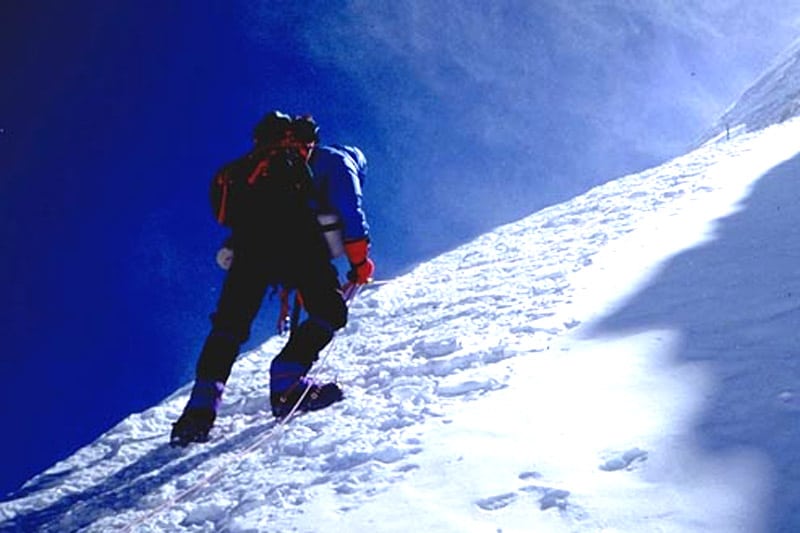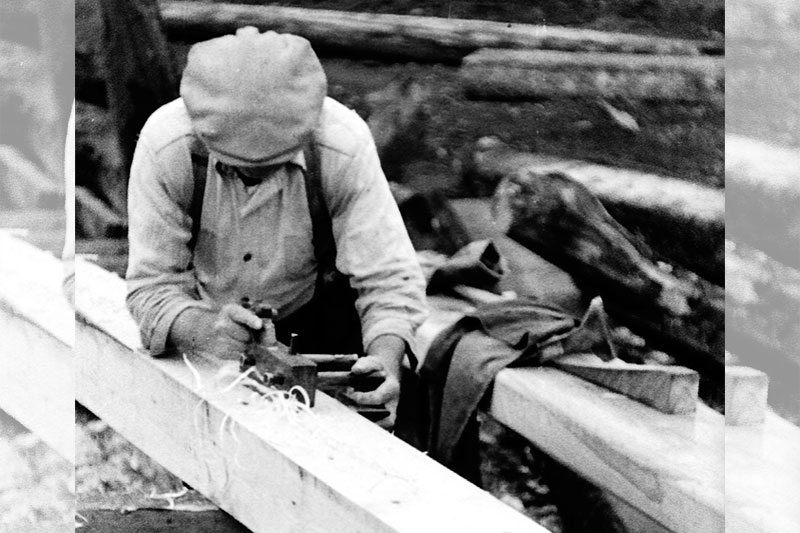
Have you ever tried to achieve a goal but achieved mediocre results?
Have you ever seen other people achieve their goals effortlessly and wonder how they do that?
This is where skills development comes in. In this post, I share more about skills development, why it’s an important part of goal achievement, and how to go about doing it.
What is Skills Development?
Skills development is the process of (1) identifying your skill gaps, and (2) developing and honing these skills. It is important because your skills determine your ability to execute your plans with success.
Imagine a carpenter trying to build a house. He has the raw materials but lacks good woodworking tools. He only has a small hammer and a small screwdriver. Without the right tools like a hand saw, he can’t turn these raw materials into pieces to build a house.

Carpenter woodworking with his tools
It’s the same with goal achievement. In goal achievement, your skills are your tools. The house is your goal. Just as you need the right tools to build a house, you need the right skills to build your goal.
Without the right skills, you will only frustrate yourself, waste your time, and spend a lot of time dealing with rudimentary issues caused by the lack of knowledge or lack of skills, as opposed to progressing in your goal. While difficulty and struggle are part and parcel of any goal pursuit, without the right skills, you find yourself struggling more than necessary. Worse still, this struggle is unconstructive and doesn’t help you move forward.
Why Skills Development is Neglected
Yet, why is skills development often neglected?
There are two main reasons.
Firstly, people are often impressed by what others have accomplished without realizing what they went through to get there. We see their accolades and victories and make gross assumptions about what it takes to succeed. Then we become disappointed when we attempt the goal and realize it’s not as easy as it seems.
This is very common in blogging. People see big-name internet “gurus” making 6–7 figure incomes from blogging. Thinking that it’s easy, and perhaps perpetuated by the claims of said gurus who happen to sell you courses claiming to help you do the same, these folks start blogging as well, expecting to achieve the same results in a short period of time. They become rudely awakened when they don’t even get a trickle of traffic after a few months, much less earn an income. Some press on; many give up.
Secondly, many of us can be heavily self-critical. We look at how successful others are — the top coaches, internet gurus, award-winning performers, winners of society — and conclude that we can never achieve the same. We feel that these people are somehow blessed with some special power that we don’t have. I often have clients who say they want to achieve XYZ goal, but after seeing very established folks in the field, feel unconfident about their abilities. They then wonder, What makes me think that I can succeed? I should just give up because these people are already so good and experienced. Who am I to compete with them?
Yet, it’s about skills development. When we see others’ successes, what we don’t see are the countless hours they spent behind the scenes, honing their craft, and building their skills. What we see as “talent” in others is the result of their 10,000 hours of hard work where raw passion and human potential are turned into hard skills. Skills development is where we turn from beginner to novice, to intermediate, to senior, to expert. And henceforth, having the ability to conquer our goal.
Example: My Writing

When I started my blog, I knew that blog writing would be an important skill to master. Yet, I was not an English major; neither had I taken any writing courses before. I was a business student and in business school we did tons of project work and case studies — nothing to do with literary writing. The one class I took that came closest to writing was a Business Communications module, and even then what was taught was totally different from blog writing.
So before I started my blog, I spent weeks reading up on good content writing, including selecting great topics, writing enticing headlines, and understanding the traits of good articles. I read blogs like Copyblogger, Men with Pens, and Zen To Done. I also analyzed articles from popular blogs, including blogs I followed, to understand how they structured their posts. After all, if they were doing well, they must be doing something right! I would dissect each article as I tried to understand the author’s thinking process, and then sought to apply that in my writing. I also created an article roadmap and brainstormed on topics to write on, topics that (a) were popular, (b) met people’s needs, and (c) were timeless.
Even then, my initial articles took really long to write. I remember my first series was on “How To Find Your Life Purpose” as purpose is the starting point of a conscious life. I took over a week to craft the 7-part series; some parts were totally rewritten before I published them! Some of my earlier articles were pretty crappy too. I would read them and cringe, thinking, Did I actually write this?? I would delete the ones that were not so relevant while rewriting the others to improve the content. In fact, this very article you’re reading now was written in 2009 and I’m now rewriting it in 2016.
But I improved. I got better. Today, I’d like to think that my writing is much sharper and on point. My language skills have also improved as I’m more aware of grammatical nuances. I’m more aware of the nuances between American and British English, including punctuation oddities (in Singapore we use British English, though I write in American English here as a higher proportion of PE readers are from the U.S.). Some of my articles have been used in school curricula, media publications, and business newsletters; many have been shared on forums and social media.
Did these happen overnight? No, whatever little writing skills I have today didn’t magically happen. Neither was I “born” with the ability to write. They came from a conscious effort to build my skills, to be a better writer.
The same goes for other skills that I didn’t know and had to build at the start of my business journey: coaching, training, new media, responsive web design, and online marketing, among many others. Doing so has helped me thrive in my goal to pursue my passion.
Likewise, if you are starting with a new goal, it’s about building your skills first. Save for rare situations where one is simply born with a natural predisposition to something (say, Mariah Carey and her five-octave vocal range, though she has acknowledged that her whistle register wasn’t just an innate ability but came from lots of practice[1]), most people cultivate their talent through many hours of hard work. The best coach wasn’t born with coaching skills; he learns it. The best musician wasn’t born with the skill to play musical instruments; he learns it. All these are skills that are developed consciously. And you can do the same too. :)
Your Skills Development: Hard and Soft Skills
In developing your skills, I’d like you to consider two groups of skills:
- Hard skills: Skills relating to any specific task; they are usually easily quantifiable. They tend to be knowledge-based, such as proficiency in a subject, certification, and technical skills. Fluency in Spanish, skills in XYZ software, graphic design, and programming are all hard skills.
- Soft skills: Skills relating to personality and tend to be transferable, such as communication, leadership, time management, stress management, decision making, adaptability, ability to deal with adversity, and networking.
It’s obvious why hard skills are important. You need domain-level knowledge to thrive in a goal. To be a successful YouTuber, you should at least have some video editing skills. To be a good blogger, you should have good writing skills and a good command of the language. To be a good software engineer, you need to know programming.
But many people miss out on soft skills. For example, a writer may insist he is great at writing but get 0 book sales. Assuming his writing skills are top-notch, perhaps he lacks certain soft skills necessary for success, like networking, pitching, and self-marketing. After all, writing a successful book isn’t just about having good writing skills:
- You need to pitch to publishers/collaborators.
- You need to market yourself to people.
- You need insightfulness that helps you understand what people want and how to write stories that resonate with people.
Many best-selling authors today aren’t necessarily good writers but are either personalities with a large following (some of these folks don’t even write their own books but use a ghostwriter) or everyday people with a story that resonates with an audience (Twilight, Fifty Shades of Grey).
That’s not to say you focus on soft skills over knowledge. Both hard and soft skills are important. When you succeed based on only soft skills but with no hard skills, you lack the foundation to create new wins. It’s a matter of time before people call you out on your bullshit. When you have only hard but no soft skills, you lack the savviness to hustle and showcase your talent to a bigger crowd out there. Both skills are equally important and complementary to each other.
How to Start Developing Skills
1) Start with the core skills
If you’re starting from ground zero, such as learning programming when you don’t know anything about coding, it can be intimidating as there are a multitude of things to learn. Start with core skills first.
- Core skills are skills you absolutely need to succeed in your goal. They have a direct impact on your success.
- Secondary skills are of lower importance vs. the core skills. While they accentuate your success, your expertise in them does not make or break your goal.
For example, when I started my business, there were many skills I had to pick up. I started with the core skills that I felt would be instrumental to my success: writing, coaching, training, and web marketing. These skills had a make-or-break effect on my goal. On the other hand, Pinterest, Facebook marketing, Twitter, and fancy web design, while helpful, were not instrumental to my success. These were consequently my secondary skills. While I took some time to learn the secondary skills, I dedicated the bulk of my time to mastering my core skills.
What determines a core or secondary skill? It depends on your goal. As long as the skill has a critical impact on your goal, it is considered a core skill. If your goal is to be a life coach with a team of sub-coaches, then life coaching, leadership, team management, and training will be your core skills. If your goal is to be a life coach with an online setup, then life coaching, web marketing, content writing, and good technical skills will be your core skills.
In times when it’s not effective to learn certain skills, I recommend outsourcing instead. Read my outsourcing guide here.
2) Break into little steps
With each skill, break the learning into small steps.
Back when I was learning life coaching, I identified the sub-skills that would make a good coach, including listening skills, questioning skills, empathy, and patience. I subsequently gave myself a rating of 1–10 on each skill and worked on these skills by giving free sessions, taking a coaching workshop, reading books, and most importantly, working with people. I also developed my own coaching guidebook, which is my repository of coaching concepts and frameworks to coach people. I would collect feedback and review my performance after each coaching session, including identifying things that I did and didn’t do well in, so I could improve.
Doing these steps helped me become proficient quickly. I moved from coaching 1 person to 2, to 4, to 8, to 10 people within a few months. Soon I was coaching my 20th client, then my 50th, and then my 100th. Before long I was seeing clear trends in my clients’ aspirations and problems and could help them in a pinpointed manner. I also became proficient where I was able to accurately analyze each client’s problems with a brief background and simple questions, and subsequently guide them out of their mental blocks.
Developing a skill can be a lofty project, so break it up into little chunks. Don’t expect to reach “master” status right away but focus on conquering each section, one bit at a time. For seemingly unquantifiable soft skills, assign quantifiable milestones to guide you. For example, if you want to cultivate networking skills, you can start by going to X new events and reaching out to X new people each week, and subsequently practice how you introduce yourself and pitch your ideas to others, iterate accordingly, and so on.
Read: The Power of Little Changes
3) Learn from the best
One of the best ways to learn is to learn from the best. That’s because you can understand from someone who’s “been there done that” and get their wisdom rather than proceed unguided. Here are some tips:
- Who are the people you know, who have experience in this area? Approach them for advice. Ask them: How should you build your skill in this area? Do they have any tips for you? What should you watch out for?
- Engage a coach. Getting a coach isn’t cheap, but if you have the financial resources and you get the right coach, you can shave hundreds of hours off your learning curve. My clients, through our sessions together, have saved hundreds of hours and sped ahead in their goals, compared to if they had struggled and dealt with these issues alone.
- Get a mentor. Is there a senior in your company or your network of contacts who would be willing to mentor you?
- Study experts in the industry. Who are the experts in your field? Study them and understand what makes them so good at what they do. Model their behavior, while adapting it to fit you.
4) Research
Research to gather different insights and perspectives. The internet has made information more accessible than ever. Research via these tools:
- Blogs. Blogs have become the primary way we receive information. Use Google to find new blogs. Bookmark the blogs that look promising.
- Podcasts. In our modern world where most of our time is spent at computers, I find audio a refreshing way to learn. iTunes and Stitcher are podcast directories with tons of free podcasts, while Audible is an audiobook portal (it’s a premium service, though your first audiobook is free). PE Podcast is listed on iTunes and Stitcher.
- Books. Books are great sources of information as they are essentially very structured forms of content, usually a collection of the author’s best wisdom on the topic. Is there a library where you live? If so, head to the library and borrow books related to the subject. If not, hit the bookstores and check out their recommended books.
- Free online courses. Online courses have become a huge thing in recent years. Here are some free course portals, including from renowned universities:
5) Attend trainings
Courses and workshops are great ways to quickly develop skills. Think of it as a concentrated source of information that has been organized into a structured program for your learning. Depending on the workshop, some workshops with a lot of activities allow for experiential learning, which means you get hands-on practice rather than learning through theory via reading. When you attend training, you are in the company of like-minds, which gives you added motivation and social support for your goal.
When looking for training, be careful to look for one with actual content and taught by a credible trainer. Ask for a breakdown of the course curriculum. There are many courses today that are filled with fluff and taught by people who are more interested in profits than in teaching. You want to stay away from those.
6) Take action
With all that said and done, it comes down to doing. As I share in this article, doing helps you learn faster than simply reading.
Earlier in the article, I shared that I built my coaching skills by reading up, taking a workshop, and working with people. The latter was the most crucial part of my learning process, for if I had never practiced working with real people, I would never have known what are the things people need help with, how to best help them, and whether my methods work. This is something I mentioned in Are Coaching Courses Necessary To Be a Coach? Ultimately, what builds expertise isn’t theory, but practice. This is especially so if your skill has an actionable component. That’s when you know how good you are, your blind spots, the gap between hypothesis and reality, and your areas for improvement.
“Doing” here depends on the skill you are building. If you’re learning to program, it means writing code, creating simple software, and testing them. If you are learning public speaking, it means practicing in front of the mirror, taping yourself and reviewing your performance, and speaking in front of real people and events.
While the action phase is probably the scariest phase of all, it is the most rewarding phase because that’s when you learn the most. That’s when you stop hiding in a bubble, get out of your comfort zone, and jump-start your learning. :) The more hours you put in, the better you will become. Allocate time to practice each day.
Read: 10,000 Hours To Develop Talent and Is Your Goal Worth 30 Minutes of Your Time Every Day?
What Skills Do You Need to Develop?
- What is a goal you’re working on now?
- What are the hard and soft skills needed to pursue this goal?
- Out of these skills, which are the core skills and which are the secondary skills?
- For your core skills, how can you start developing them? How can you apply the above tips?
- When can you start taking action on these steps?
Start developing your skills and soon enough, you will see the rewards of your labor. :)
(Images: Man climbing, Carpenter, Writing)




![How Your Language Relates with Success [Infographic]](https://personalexcellence.co/files/infographic-self-talk-success-200x156.jpg)


![How Many Times Should You Try? [Infographic]](https://personalexcellence.co/files/infographic-failure-200x157.png)
![Never Stop Trying [Infographic]](https://personalexcellence.co/files/infographic-never-stop-trying-200x144.png)
 Thanks for reading. If you like my free articles, join my private email list and get my latest updates and articles sent right to your inbox.
Thanks for reading. If you like my free articles, join my private email list and get my latest updates and articles sent right to your inbox.